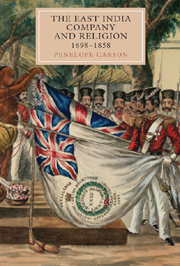Book contents
- Frontmatter
- Contents
- Acknowledgements
- Note on Hinduism
- Abbreviations
- Map of India
- Introduction
- 1 A Christian Company?
- 2 The East India Company, Britain and India 1770–1790
- 3 The 1790s: A Time of Crisis
- 4 The Pillar of Fire Moves Forward: The Advent of British Missionaries 1793–1806
- 5 The Wisdom of the Serpent and the Innocence of the Dove: The Vellore Mutiny and the Pamphlet War 1806–1808
- 6 Troubled Years 1807–1812
- 7 Battle Lines Drawn: Missions, Dissent and the Establishment
- 8 The 1813 Renewal of the Company's Charter: The Religious Public Takes on the Company
- 9 A Turbulent Frontier: The Company and Religion 1814–1828
- 10 A New Dawn? The Era of Lord William Bentinck 1828–1835
- 11 Between Scylla and Charibdis 1836–1858
- Conclusion and Epilogue: Strangers in the Land
- Appendix 1 Presidents of the Board of Control
- Appendix 2 Governors-General and Governors of Madras and Bombay
- Appendix 3 Aide Memoire to Names
- Appendix 4 ‘The Pious Clause’
- Bibliography
- Index
- WORLDS OF THE EAST INDIA COMPANY
7 - Battle Lines Drawn: Missions, Dissent and the Establishment
Published online by Cambridge University Press: 05 February 2013
- Frontmatter
- Contents
- Acknowledgements
- Note on Hinduism
- Abbreviations
- Map of India
- Introduction
- 1 A Christian Company?
- 2 The East India Company, Britain and India 1770–1790
- 3 The 1790s: A Time of Crisis
- 4 The Pillar of Fire Moves Forward: The Advent of British Missionaries 1793–1806
- 5 The Wisdom of the Serpent and the Innocence of the Dove: The Vellore Mutiny and the Pamphlet War 1806–1808
- 6 Troubled Years 1807–1812
- 7 Battle Lines Drawn: Missions, Dissent and the Establishment
- 8 The 1813 Renewal of the Company's Charter: The Religious Public Takes on the Company
- 9 A Turbulent Frontier: The Company and Religion 1814–1828
- 10 A New Dawn? The Era of Lord William Bentinck 1828–1835
- 11 Between Scylla and Charibdis 1836–1858
- Conclusion and Epilogue: Strangers in the Land
- Appendix 1 Presidents of the Board of Control
- Appendix 2 Governors-General and Governors of Madras and Bombay
- Appendix 3 Aide Memoire to Names
- Appendix 4 ‘The Pious Clause’
- Bibliography
- Index
- WORLDS OF THE EAST INDIA COMPANY
Summary
The present inclination of my mind, [is] to throw open the whole, and even abolish the East India Company altogether, rather than not insure a passage for the entrance of light.
(William Wilberforce)BY 1812, it was clear to the Company that it was under siege once again: there were numerous interests determined to end its monopoly of trade in the East. The Company was equally determined to keep interlopers out of its domains and protected its interests with increasing forcefulness, refusing licences and insisting that those who managed to enter India illegally be sent home. We saw in the previous chapter how this had affected missionaries. With the Company's charter due for renewal, both missionaries in India and their friends at home believed the time for legislative action had come.
Initially Wilberforce believed that there should be a partnership between those wanting to end the Company's monopoly and the missionary lobby. In February 1812 he wrote in his diary that those interested in the cause of religion would probably be compelled ‘to join the great body of commercial and political economy men, who will I doubt not contend for destroying the monopoly of the Company, and leaving the road to the East Indies free and open’. However, Grant, as a Director and former Chairman of the Company, had a very narrow view of the relationship between trade and Christianity. He was unequivocally against the ending of the Company's monopoly, fearing that the opening of India to unlicensed adventurers would be disastrous for commercial, political and religious reasons.
- Type
- Chapter
- Information
- The East India Company and Religion, 1698-1858 , pp. 110 - 129Publisher: Boydell & BrewerPrint publication year: 2012



